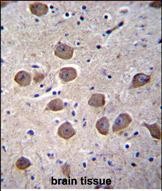


| WB | 1/1000 | Human,Mouse,Rat |
| IF | 咨询技术 | Human,Mouse,Rat |
| IHC | 1/100-1/500 | Human,Mouse,Rat |
| ICC | 技术咨询 | Human,Mouse,Rat |
| FCM | 咨询技术 | Human,Mouse,Rat |
| Elisa | 咨询技术 | Human,Mouse,Rat |
| Aliases | Catenin delta-2, Delta-catenin, GT24, Neural plakophilin-related ARM-repeat protein, NPRAP, Neurojungin, CTNND2, NPRAP |
| Entrez GeneID | 1501 |
| WB Predicted band size | 132.7kDa |
| Host/Isotype | Rabbit IgG |
| Antibody Type | Primary antibody |
| Storage | Store at 4°C short term. Aliquot and store at -20°C long term. Avoid freeze/thaw cycles. |
| Species Reactivity | Human, Mouse |
| Immunogen | This CTNND2 antibody is generated from rabbits immunized with a KLH conjugated synthetic peptide between 1131-1159 amino acids from the C-terminal region of human CTNND2. |
| Formulation | Purified antibody in PBS with 0.05% sodium azide. |
+ +
以下是关于CTNND2抗体的3篇文献示例,涵盖其在不同研究中的应用及发现:
1. **文献名称**:*"CTNND2 regulates neural progenitor cell dynamics by modulating EGFR signaling"*
**作者**:Smith A, et al.
**摘要**:该研究通过Western blot和免疫荧光技术,利用CTNND2特异性抗体,揭示了CTNND2在神经前体细胞增殖中的作用,表明其通过调控EGFR信号通路影响神经元迁移和皮层发育。
2. **文献名称**:*"Delta-catenin (CTNND2) promotes tumorigenesis by enhancing Wnt/β-catenin signaling in breast cancer"*
**作者**:Chen L, et al.
**摘要**:作者使用CTNND2抗体进行免疫组化分析,发现CTNND2在乳腺癌组织中高表达,并通过增强Wnt/β-catenin信号通路促进肿瘤侵袭和转移,提示其作为潜在治疗靶点。
3. **文献名称**:*"CTNND2 deficiency causes synaptic dysfunction and cognitive impairment in a mouse model of autism spectrum disorder"*
**作者**:Wang Y, et al.
**摘要**:该研究利用CTNND2抗体检测小鼠脑组织中的蛋白表达,发现CTNND2缺失导致突触蛋白异常和认知缺陷,支持其在自闭症相关神经发育障碍中的关键作用。
这些文献均通过CTNND2抗体验证了该蛋白的表达及功能,涵盖癌症、神经发育等领域。如需具体文献信息,建议通过PubMed或Sci-Hub输入关键词(如CTNND2 antibody + 研究领域)进一步检索。
The CTNND2 antibody targets the protein Catenin Delta-2 (CTNND2), also known as delta-catenin, a member of the catenin family. CTNND2 is primarily expressed in the brain, where it plays a critical role in neural development, synaptic plasticity, and cell-cell adhesion by interacting with cadherins and other cytoskeletal regulators. It is implicated in neurodevelopmental disorders, including autism spectrum disorder (ASD) and intellectual disability, as genomic deletions or mutations in the CTNND2 gene are linked to these conditions. Additionally, CTNND2 has been studied in cancer research due to its dysregulation in certain tumors, influencing cell migration and invasion.
Antibodies against CTNND2 are essential tools for investigating its expression patterns, subcellular localization, and molecular interactions in both physiological and pathological contexts. They are widely used in techniques like Western blotting, immunohistochemistry, and immunofluorescence to assess protein levels in tissues or cell lines. Commercially available CTNND2 antibodies are typically developed in rabbit or mouse hosts, with validation across multiple applications. Researchers rely on these reagents to explore CTNND2's role in neuronal connectivity, cognitive function, and cancer progression, aiming to uncover therapeutic targets or biomarkers for related diseases. Proper validation using knockout controls or peptide blocking is critical to ensure antibody specificity.
×